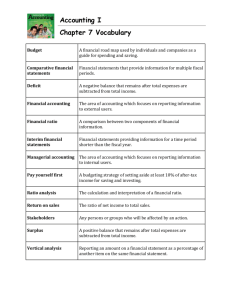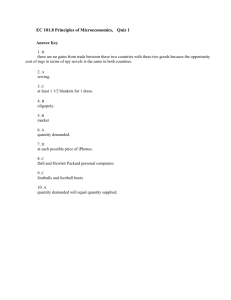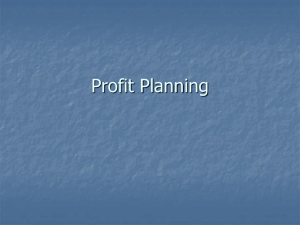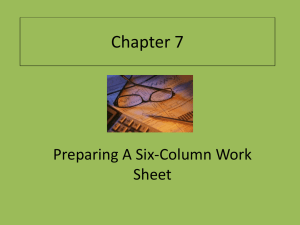Answer: The Free Enterprise System
advertisement
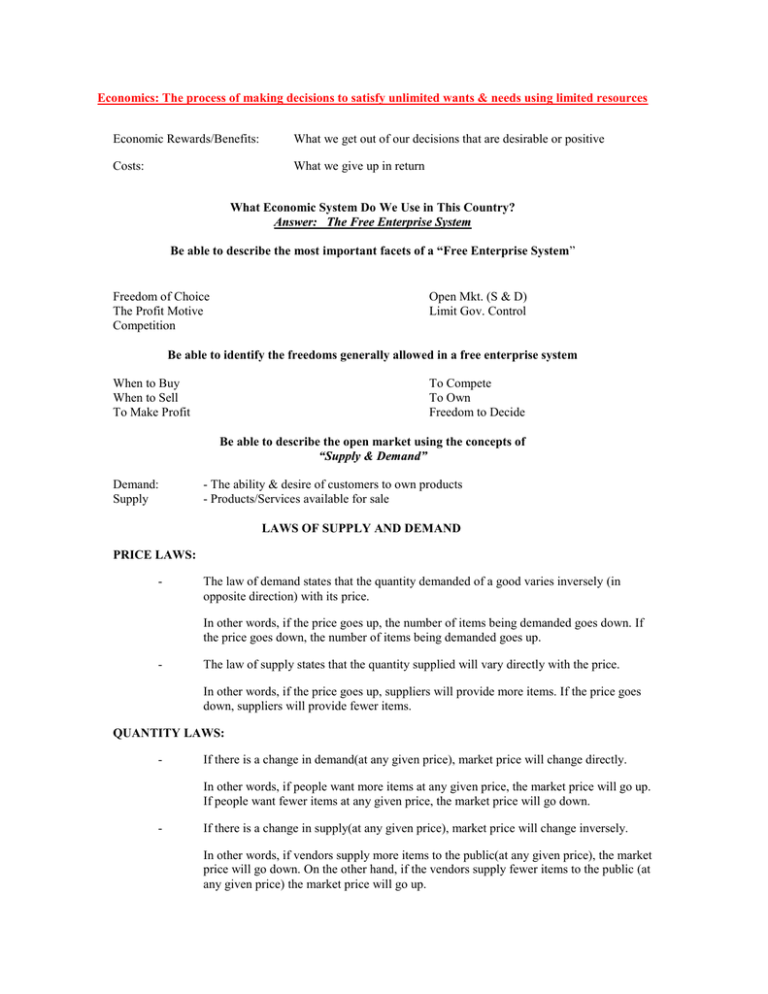
Economics: The process of making decisions to satisfy unlimited wants & needs using limited resources Economic Rewards/Benefits: What we get out of our decisions that are desirable or positive Costs: What we give up in return What Economic System Do We Use in This Country? Answer: The Free Enterprise System Be able to describe the most important facets of a “Free Enterprise System” Freedom of Choice The Profit Motive Competition Open Mkt. (S & D) Limit Gov. Control Be able to identify the freedoms generally allowed in a free enterprise system When to Buy When to Sell To Make Profit To Compete To Own Freedom to Decide Be able to describe the open market using the concepts of “Supply & Demand” Demand: Supply - The ability & desire of customers to own products - Products/Services available for sale LAWS OF SUPPLY AND DEMAND PRICE LAWS: - The law of demand states that the quantity demanded of a good varies inversely (in opposite direction) with its price. In other words, if the price goes up, the number of items being demanded goes down. If the price goes down, the number of items being demanded goes up. - The law of supply states that the quantity supplied will vary directly with the price. In other words, if the price goes up, suppliers will provide more items. If the price goes down, suppliers will provide fewer items. QUANTITY LAWS: - If there is a change in demand(at any given price), market price will change directly. In other words, if people want more items at any given price, the market price will go up. If people want fewer items at any given price, the market price will go down. - If there is a change in supply(at any given price), market price will change inversely. In other words, if vendors supply more items to the public(at any given price), the market price will go down. On the other hand, if the vendors supply fewer items to the public (at any given price) the market price will go up. Be able to define the following terms associated with the concept of PROFIT: Income, Expenses, Costs, Gross Profit, Net Profit, & Risk Profit Income Cost Expenses Gross Profit Net Profit Risk - Incentive - the amount of money a business receives from the sales of its goods/services - The amount of money a company spends to get product into the store - The amount of money a company spends on the operation of the business - Amount of money made after the cost of goods is subtracted (Income - Cost) - The amount of money made after the cost of goods & expenses are subtracted out - The “gamble” a business takes that it might lose money instead of making money Profit is Good, but What Do We Risk? Our own money The money of other people (friends, relatives, banks, etc.) Our time & energy that we could spend on a career Our hopes/dreams (self esteem, inheritance, freedom, etc.) Be able to discuss ways a business can increase its profits Increasing Profits Increase Sales Increase Efficiency Boost Productivity Raise Prices Be able to define the types of competition & discuss in a short answer question the advantages to competition in our economy A rivalry between two or more companies to attract scarce (limited) customer dollars Market Share - A company’s part of the total market for a product Direct vs. Indirect - Using the same product to compete vs similar but distinctly different ones Price vs. Nonprice - Instead of lowest price, compete with better service, quality, location, etc. Monopoly - No Competition Benefits of Competition New Products & Services Variety of Products/ Services Lower Prices Better Customer Service Higher Quality Merchandise More Information Provided Etc. In a matching exercise & essay, be able to describe the role of government in a Free Enterprise system Protect Business Property Enforce Contracts Settle Disagreements Collect & Set Taxes Provide for Public Welfare Protect Public Health Regulate/Stabilize Economy Conserve the Environment Protect Consumers Protect Competition Regulate the Workplace Government Services Military Police Fire Protection Education Thus Endth the Economics Unit Infrastructure Postal Libraries Welfare Services
